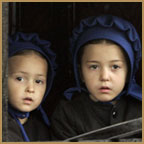 |
|
This year’s 12 most inspiring people once again proved the power of individuals to act with love, courage, and forgiveness in the most challenging situations. We asked you to choose between some tremendously inspiring folks, and we were in for some surprises. Hip-hop mogul Russell Simmons, who spoke against racism and anti-Semitism, and "green" evangelical Rev. Richard Cizik, who works to save the environment, were knocked off in the first round. Perhaps the biggest surprise was that a homeless Some other truly remarkable people lost by a slim margin. Elissa Montanti, the “saint of Staten Island,” who with single-minded devotion cuts red tape to get prosthetic limbs and medical help for war-maimed children, lost narrowly to Todd Corbin, a marine who courageously saved the lives of his unit in In the second round of voting, Lance Corporal Todd Corbin of The other two final candidates showed the kind of radical forgiveness that some have called miraculous. Both finalists suffered the horror of having of having family members brutally murdered. Immaculee Ilibagiza, a survivor of the Rwandan genocide, hid in a tiny bathroom for three months and emerged to find her parents, siblings, and thousands of countrymen dead. At first unable to pray because of her anger, Immaculee surrendered “everything to God” and in a vision understood what Jesus meant when he said “Forgive them, Father, for they don't know what they do.” She prayed for her enemies and the anger was lifted. She reached out to her father’s killer, and has been lecturing all over the country on the power and importance of forgiveness. Her inspiring example is a beacon for many Beliefnet users. The Amish of Nickel Mines, Pa.—a pacifist religious community in rural Lancaster County who practice a simple farming life without modern conveniences much the same as their 17th century Swiss-German forbears—suffered a shocking intrusion into their world when a local milkman, Charles Roberts, invaded a one-room schoolhouse, shooting 10 young girls, leaving five of them dead. During the ordeal, one of the girls, 13-year-old Marian Fisher, offered to be killed first in hopes that the others would be spared. (View video: A Young Girl's Sacrifice.) A Beliefnet member wrote of this event: “I cannot ignore this unbelievable act of love by a girl this young. In my mind, this little girl did no more or no less than Jesus did for us on the cross.” Within hours of the shooting, the families of the children not only expressed their forgiveness of the killer but reached out to his family, giving food and raising money for his wife and children. For the incredible example of living faith on the part of an entire community that lost its children, the majority of Beliefnet users cast their votes for the Amish. And the editors of Beliefnet follow their lead by naming the Amish of Nickel Mines, |
2016-06-30
2016-06-30
more from beliefnet and our partners


